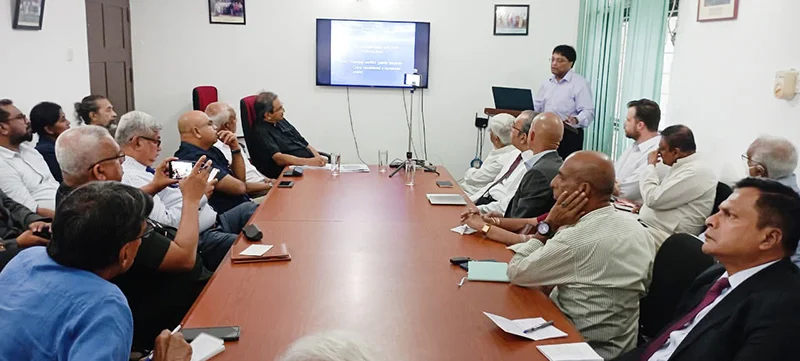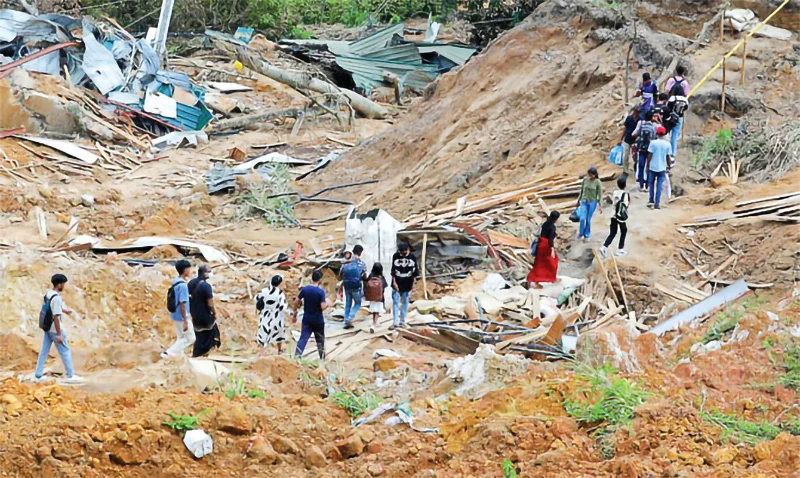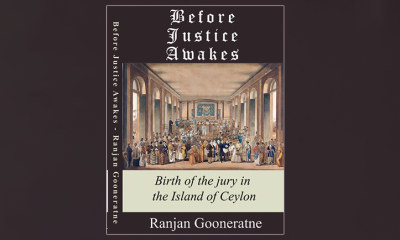Features
COLORADO SUPREME COURT DISQUALIFIES TRUMP ON 2024 STATE BALLOT

DOW JONES INDEX HITS ALL-TIME HIGH
by Vijaya Chandrasoma
In September, Colorado District Court Judge Sarah Wallace ruled that Donald Trump is qualified to contest the Colorado primary ballot in 2024. Her ruling hinged on a technical interpretation of the wording of Section 3 of the 14th Amendment, which states:
No person shall be a Senator or Representative in Congress, or elector of the President and Vice-President, or hold any office, civil or military, under the United States, or any other state, who previously having taken an oath, as a member of Congress, or as an officer of the United States, or as a member of any state legislature, or as an executive or judicial officer of any state, to support the Constitution of the United States shall have engaged in insurrection or rebellion against the same, or given aid or comfort to the enemies thereof. But Congress, may by a vote of two-thirds each House, remove such disability.
The 14th Amendment was ratified after the Civil War in 1868, based on a statement made by President Abraham Lincoln, when he spoke to Congress in 1861:
“When ballots have been fairly, and constitutionally decided, there can be no successful appeal back to bullets”.
Lincoln’s grave has been spinning violently since 2020.
In her ruling, Judge Wallace acknowledged that Trump was guilty of inciting a violent insurrection to subvert the constitutional function of Congress, engaged in the certification of the election of President Biden.
However, on a strict but preposterous interpretation of the 14th Amendment, she deemed that a president of the United States is not an “officer of the United States”, because the 14th Amendment did not specifically contain the word “president”.
Preposterous, as the Amendment includes all those who have sworn allegiance to the Constitution, which is the first action of the new President when he formally assumes the presidency, as Trump did in January 2017.
When she submitted her ruling, Judge Wallace all but implored the Colorado Supreme Court to overrule her decision. Her prayers were answered last Tuesday.
Since her ruling in September, there has been increasing momentum among the legal community, ratifying the constitutional argument that, according to the 14th Amendment, Trump should be disbarred from contesting any federal position, including the presidency.
Lawrence Tribe, Professor Emeritus of Constitutional Law at Harvard University, Founder of the American Constitution Society and deemed one of the nation’s foremost authorities on Constitutional Law, stated, “The people who wrote the 14th Amendment were not fools. They realized that if those people who tried to overturn the country, who tried to get rid of our peaceful transitions of power are again put in power, that would be end of the nation, the end of democracy”.
Santa came early this year, when, on Tuesday, December 19, the Colorado Supreme Court reversed the lower court decision, and ruled that Trump be disqualified from being on the state’s 2024 presidential ballot. The ruling was based on Section 3 of the 14th Amendment, that Trump “engaged in an insurrection with his words and actions around the January 6 attack on the US Capitol” and therefore cannot hold the nation’s highest office again. The fact that the word “president” was missing in the Amendment was not relevant as the president was an officer of the state who had taken an oath to uphold the Constitution of the United States.
Section 3 of the 14th Amendment is a self-executing provision of the Constitution, a provision that can be enforced without the aid of a legislative enactment, like a conviction.
Republicans argue that the question of who should be on the presidential ballot is a matter for Congress, not a decision to be made by state courts.
The Colorado ruling will now be appealed before the Supreme Court of the United States.
The Supreme Court gives Trump a 6/3 advantage. A prejudiced highest court in a land where not only the judiciary, but the legislature and the executive functions are debased to levels that would be treated with contempt in the most corrupt Banana Republic.
A land where a criminal, convicted of fraud and sexual assault, arrested and on bail for 91 felonies, including espionage and attempting to incite an insurrection to overturn one of the fairest elections in the nation’s history, walks free. He also is the choice of the majority of the electorate to again preside over the country whose democracy he had incited his terrorist supporters to overthrow. And now threatens openly, in his campaign rallies, that, if he is re-elected to the presidency, he will terminate the Constitution revered throughout the world, prosecute his political opponents and marginalize a large swath of its minorities. He is on a path to succeed where Hitler failed.
The final ruling of the Supreme Court may not only affect the Colorado ballot, but also those of other states. All 50 states have mechanisms in place to disqualify candidates who do not meet basic presidential requirements, and many will likely use these mechanisms to disqualify Trump, depending on the final ruling of the Supreme Court.
There is one important factor to be considered regarding the US Supreme Court, which could have some influence on the Colorado ruling to disbar Trump from contesting the presidency in 2024:
Conservative Justice Clarence Thomas has already recused himself from a case related to the January 6, 2021 insurrection at the US Capitol, an appeal brought by John Eastman, former Trump adviser, indicted on election fraud. No reason for Thomas’ recusal was given, though his corruption and his wife’s complicity in the January 6 insurrection are ongoing scandals.
Thomas’ recusal on the Eastman case may set a precedent for him to recuse himself on all future cases involving the insurrection. In that event, the Republican majority in the Supreme Court on the Colorado case will be reduced to 5/3, with a possibility of an even 4/4, with Chief Justice Roberts usually voting not on party lines but on conscience.
Also, Justice Kavanaugh, in previous writings, has approved the immunity of a sitting president of investigation into all crimes, but opined that immunity no longer exists after he leaves the office. Of course, he is not necessarily compelled to base his rulings on past writings.
Trump thrives on incriminating legal decisions, which he, like no politician in history, can turn to his advantage, even make tons of money from his criminal behavior. The more damning the legal accusations as to his criminality, even his treason, the higher his ratings rise, the more funds he raises from his devoted supporters. Trump may be a treacherous moron, but his God has compensated him with the gift of making money out of crime that transcends all his many evil character flaws.
Recently, Trump has juiced up his incredibly bigoted, cruel and noxious anti-immigrant and anti-Semitic rhetoric, getting more evil every passing day. Vile rhetoric, direct quotations from Hitler’s Mein Kampf – “vermin poisoning the blood of our people”, “mass deportation camps” – have been his regular oratorical fare at campaign rallies.
However, the virulent speeches made during the past week, which make Hitler’s rants sound like children’s bedtime stories, were no longer the impromptu drivel of a racist madman. They have been read from a teleprompter, indicating that they represent the official Republican Party line. Extreme authoritarian policies which will maintain the privileges of Christian white supremacists, and take America back to the good old days of segregation and Jim Crow.
This latest decision to openly toe the Nazi, white supremacist line was probably made by Trump and the billionaires and corporations who fund the Republican Party because it seems to be working. What is truly frightening is that these racist, fascist rants at campaign rallies are not only met with thunderous applause from Trump’s devoted supporters, but are now gaining the approval of an alarmingly large section of the American electorate. The reason Trump continues to spew such hatred may be because he feels that America is ready for a “temporary” dictator, ready to exterminate those vermin who poison the blood of white people. Sure worked for Hitler. Until the American cavalry came to the rescue in 1945.
If Trump is defeated in November, he will once again claim the election was rigged, refuse to concede defeat and incite a Civil War. Unfortunately, Americans cannot count on the cavalry to appear at the last moment to rescue them, because they themselves are the cavalry.
The more vitriolic Trump’s anti-immigrant and anti-Semitic rantings. the higher his poll numbers rise. The more Trump shouts about the Jews and brown-skinned immigrants not just from Latin America, but from Africa and Asia (Europeans are fine, Russians welcome) being the enemies of the people, the greater his popularity, not just from the cult, but also from moderate Republicans and Independents. The holocaust may be a nightmare of the past for the Germans, but it could well be a harbinger for the America of the future.
Trump even sings the praises of murderous dictators like Russia’s Putin and Hungary’s Orban, who graciously reciprocate the compliment. Orban said that Trump is the only hope for the salvation of the western world – which, in this context, means the salvation of white supremacy.
The re-election of a twice impeached, quadruple indicted former president is a terrifying prospect. He has now doubled down on his resolve to be a “dictator for a day” if re-elected. Only it won’t be for a day.
As Maya Angelou, renowned poet and political activist once said, “When people show you who they are, believe them the first time”.
The latest rumor is that a red binder containing top-secret files, a collection of intelligence on Russian collusion in the 2016 election shared with NATO, has gone missing since Trump left the White House. These files are said to be buried in first wife Ivana Trump’s coffin, behind the first tee at his golf course in Bedminster, New Jersey.
Top-secret documents may well be on sale at the White House gift shop, if Trump wins a second term. Trump will personally declassify and sign them for an extra charge.
The obvious alternative to a Nazi dictatorship in 2024 would be incumbent President Biden or the presidential candidate of the Democratic Party, to ensure that the nation will continue with the progressive policies initiated during Biden’s first two years. Legislation already showing positive results in the form of an improving economy, low unemployment, inflation under control and rising wages. Last week, the Dow Jones Industrial Average, the most reliable gauge of the strength of an economy, reached an all-time high of 37,305 points.
Besides, I feel that regular Americans are getting sick of Trump’s whining that he has been the perpetual victim of a multitude of witch-hunts. Even during the four years when he held the most powerful position in the world, he failed to catch these hunters, who exist only in that deluded piece of crap that masquerades as a mind.
On that mildly indecent but hopeful note, I wish you all a Merry Christmas.
Features
The US-China rivalry and challenges facing the South

 The US-China rivalry could be said to make-up the ‘stuff and substance’ of world politics today but rarely does the international politics watcher and student of the global South in particular get the opportunity of having a balanced and comprehensive evaluation of this crucial relationship. But such a balanced assessment is vitally instrumental in making sense of current world power relations.
The US-China rivalry could be said to make-up the ‘stuff and substance’ of world politics today but rarely does the international politics watcher and student of the global South in particular get the opportunity of having a balanced and comprehensive evaluation of this crucial relationship. But such a balanced assessment is vitally instrumental in making sense of current world power relations.
Thanks to the Regional Centre for Strategic Studies (RCSS), Colombo the above window of opportunity was opened on December 8th for those sections of the public zealously pursuing an understanding of current issues in global politics. The knowledge came via a forum that was conducted at the RCSS titled, ‘The US-China Rivalry and Implications for the Indo-Pacific’, where Professor Neil DeVotta of the Wake Forest University of North Carolina in the US, featured as the speaker.
A widely representative audience was present at the forum, including senior public servants, the diplomatic corps, academics, heads of civil society organizations, senior armed forces personnel and the media. The event was ably managed by the Executive Director of the RCSS, retired ambassador Ravinatha Aryasinha. Following the main presentation a lively Q&A session followed, where many a point of interest was aired and discussed.
While there is no doubt that China is fast catching up with the US with regard to particularly military, economic, scientific and technological capability, Prof. DeVotta helped to balance this standard projection of ‘China’s steady rise’ by pointing to some vital facts about China, the omission of which would amount to the observer having a somewhat uninformed perception of global political realities.
The following are some of the facts about contemporary China that were highlighted by Prof. DeVotta:
* Money is steadily moving out of China and the latter’ s economy is slowing down. In fact the country is in a ‘ Middle Income Trap’. That is, it has reached middle income status but has failed to move to upper income status since then.
* People in marked numbers are moving out of China. It is perhaps little known that some Chinese are seeking to enter the US with a view to living there. The fact is that China’s population too is on the decline.
* Although the private sector is operative in China, there has been an increase in Parastatals; that is, commercial organizations run by the state are also very much in the fore. In fact private enterprises have begun to have ruling Communist Party cells in them.
* China is at its ‘peak power’ but this fact may compel it to act ‘aggressively’ in the international sphere. For instance, it may be compelled to invade Taiwan.
* A Hard Authoritarianism could be said to characterize central power in China today, whereas the expectation in some quarters is that it would shift to a Soft Authoritarian system, as is the case in Singapore.
* China’s influence in the West is greater than it has ever been.
The speaker was equally revelatory about the US today. Just a few of these observations are:
* The US is in a ‘Unipolar Moment’. That is, it is the world’s prime power. Such positions are usually not longstanding but in the case of the US this position has been enjoyed by it for quite a while.
* China is seen by the US as a ‘Revisionist Power’ as opposed to being a ‘Status Quo Power.’ That is China is for changing the world system slowly.
* The US in its latest national security strategy is paying little attention to Soft Power as opposed to Hard Power.
* In terms of this strategy the US would not allow any single country to dominate the Asia-Pacific region.
* The overall tone of this strategy is that the US should step back and allow regional powers to play a greater role in international politics.
* The strategy also holds that the US must improve economic ties with India, but there is very little mention of China in the plan.
Given these observations on the current international situation, a matter of the foremost importance for the economically weakest countries of the South is to figure out how best they could survive materially within it. Today there is no cohesive and vibrant collective organization that could work towards the best interests of the developing world and Dr. DeVotta was more or less correct when he said that the Non-alignment Movement (NAM) has declined.
However, this columnist is of the view that rather being a spent force, NAM was allowed to die out by the South. NAM as an idea could never become extinct as long as economic and material inequalities between North and South exist. Needless to say, this situation is remaining unchanged since the eighties when NAM allowed itself to be a non-entity so to speak in world affairs.
The majority of Southern countries did not do themselves any good by uncritically embracing the ‘market economy’ as a panacea for their ills. As has been proved, this growth paradigm only aggravated the South’s development ills, except for a few states within its fold.
Considering that the US would be preferring regional powers to play a more prominent role in the international economy and given the US’ preference to be a close ally of India, the weakest of the South need to look into the possibility of tying up closely with India and giving the latter a substantive role in advocating the South’s best interests in the councils of the world.
To enable this to happen the South needs to ‘get organized’ once again. The main differences between the past and the present with regard to Southern affairs is that in the past the South had outstanding leaders, such as Jawaharlal Nehru of India, who could doughtily stand up for it. As far as this columnist could ascertain, it is the lack of exceptional leaders that in the main led to the decline of NAM and other South-centred organizations.
Accordingly, an urgent task for the South is to enable the coming into being of exceptional leaders who could work untiringly towards the realization of its just needs, such as economic equity. Meanwhile, Southern countries would do well to, indeed, follow the principles of NAM and relate cordially with all the major powers so as to realizing their best interests.
Features
Sri Lanka and Global Climate Emergency: Lessons of Cyclone Ditwah

Tropical Cyclone Ditwah, which made landfall in Sri Lanka on 28 November 2025, is considered the country’s worst natural disaster since the deadly 2004 tsunami. It intensified the northeast monsoon, bringing torrential rainfall, massive flooding, and 215 severe landslides across seven districts. The cyclone left a trail of destruction, killing nearly 500 people, displacing over a million, destroying homes, roads, and railway lines, and disabling critical infrastructure including 4,000 transmission towers. Total economic losses are estimated at USD 6–7 billion—exceeding the country’s foreign reserves.
The Sri Lankan Armed Forces have led the relief efforts, aided by international partners including India and Pakistan. A Sri Lanka Air Force helicopter crashed in Wennappuwa, killing the pilot and injuring four others, while five Sri Lanka Navy personnel died in Chundikkulam in the north while widening waterways to mitigate flooding. The bravery and sacrifice of the Sri Lankan Armed Forces during this disaster—as in past disasters—continue to be held in high esteem by grateful Sri Lankans.
The Sri Lankan government, however, is facing intense criticism for its handling of Cyclone Ditwah, including failure to heed early warnings available since November 12, a slow and poorly coordinated response, and inadequate communication with the public. Systemic issues—underinvestment in disaster management, failure to activate protocols, bureaucratic neglect, and a lack of coordination among state institutions—are also blamed for avoidable deaths and destruction.
The causes of climate disasters such as Cyclone Ditwah go far beyond disaster preparedness. Faulty policymaking, mismanagement, and decades of unregulated economic development have eroded the island’s natural defenses. As climate scientist Dr. Thasun Amarasinghe notes:
“Sri Lankan wetlands—the nation’s most effective natural flood-control mechanism—have been bulldosed, filled, encroached upon, and sold. Many of these developments were approved despite warnings from environmental scientists, hydrologists, and even state institutions.”
Sri Lanka’s current vulnerabilities also stem from historical deforestation and plantation agriculture associated with colonial-era export development. Forest cover declined from 82% in 1881 to 70% in 1900, and to 54–50% by 1948, when British rule ended. It fell further to 44% in 1954 and to 16.5% by 2019.
Deforestation contributes an estimated 10–12% of global greenhouse gas emissions. Beyond removing a vital carbon sink, it damages water resources, increases runoff and erosion, and heightens flood and landslide risk. Soil-depleting monocrop agriculture further undermines traditional multi-crop systems that regenerate soil fertility, organic matter, and biodiversity.
In Sri Lanka’s Central Highlands, which were battered by Cyclone Ditwah, deforestation and unregulated construction had destabilised mountain slopes. Although high-risk zones prone to floods and landslides had long been identified, residents were not relocated, and construction and urbanisation continued unchecked.
Sri Lanka was the first country in Asia to adopt neoliberal economic policies. With the “Open Economy” reforms of 1977, a capitalist ideology equating human well-being with quantitative growth and material consumption became widespread. Development efforts were rushed, poorly supervised, and frequently approved without proper environmental assessment.
Privatisation and corporate deregulation weakened state oversight. The recent economic crisis and shrinking budgets further eroded environmental and social protections, including the maintenance of drainage networks, reservoirs, and early-warning systems. These forces have converged to make Sri Lanka a victim of a dual climate threat: gradual environmental collapse and sudden-onset disasters.
Sri Lanka: A Climate Victim
Sri Lanka’s carbon emissions remain relatively small but are rising. The impact of climate change on the island, however, is immense. Annual mean air temperature has increased significantly in recent decades (by 0.016 °C annually between 1961 and 1990). Sea-level rise has caused severe coastal erosion—0.30–0.35 meters per year—affecting nearly 55% of the shoreline. The 2004 tsunami demonstrated the extreme vulnerability of low-lying coastal plains to rising seas.
The Cyclone Ditwah catastrophe was neither wholly new nor surprising. In 2015, the Geneva-based Internal Displacement Monitoring Centre (IDMC) identified Sri Lanka as the South Asian country with the highest relative risk of disaster-related displacement: “For every million inhabitants, 15,000 are at risk of being displaced every year.”
IDMC also noted that in 2017 the country experienced seven disaster events—mainly floods and landslides—resulting in 135,000 new displacements and that Sri Lanka “is also at risk for slow-onset impacts such as soil degradation, saltwater intrusion, water scarcity, and crop failure”.
Sri Lanka ranked sixth among countries most affected by extreme weather events in 2018 (Germanwatch) and second in 2019 (Global Climate Risk Index). Given these warnings, Cyclone Ditwah should not have been a surprise. Scientists have repeatedly cautioned that warmer oceans fuel stronger cyclones and warmer air holds more moisture, leading to extreme rainfall. As the Ceylon Today editorial of December 1, 2025 also observed:
“…our monsoons are no longer predictable. Cyclones form faster, hit harder, and linger longer. Rainfall becomes erratic, intense, and destructive. This is not a coincidence; it is a pattern.”
Without urgent action, even more extreme weather events will threaten Sri Lanka’s habitability and physical survival.
A Global Crisis
Extreme weather events—droughts, wildfires, cyclones, and floods—are becoming the global norm. Up to 1.2 billion people could become “climate refugees” by 2050. Global warming is disrupting weather patterns, destabilising ecosystems, and posing severe risks to life on Earth. Indonesia and Thailand were struck by the rare and devastating Tropical Cyclone Senyar in late November 2025, occurring simultaneously with Cyclone Ditwah’s landfall in Sri Lanka.
More than 75% of global greenhouse gas emissions—and nearly 90% of carbon emissions—come from burning coal, oil, and gas, which supply about 80% of the world’s energy. Countries in the Global South, like Sri Lanka, which contribute least to greenhouse gas emissions, are among the most vulnerable to climate devastation. Yet wealthy nations and multilateral institutions, including the World Bank, continue to subsidise fossil fuel exploration and production. Global climate policymaking—including COP 30 in Belém, Brazil, in 2025—has been criticised as ineffectual and dominated by fossil fuel interests.
If the climate is not stabilised, long-term planetary forces beyond human control may be unleashed. Technology and markets are not inherently the problem; rather, the issue lies in the intentions guiding them. The techno-market worldview, which promotes the belief that well-being increases through limitless growth and consumption, has contributed to severe economic inequality and more frequent extreme weather events. The climate crisis, in turn, reflects a profound mismatch between the exponential expansion of a profit-driven global economy and the far slower evolution of human consciousness needed to uphold morality, compassion, generosity and wisdom.
Sri Lanka’s 2025–26 budget, adopted on November 14, 2025—just as Cyclone Ditwah loomed—promised subsidised land and electricity for companies establishing AI data centers in the country.
President Anura Kumara Dissanayake told Parliament: “Don’t come questioning us on why we are giving land this cheap; we have to make these sacrifices.”
Yet Sri Lanka is a highly water-stressed nation, and a growing body of international research shows that AI data centers consume massive amounts of water and electricity, contributing significantly to greenhouse gas emissions.
The failure of the narrow, competitive techno-market approach underscores the need for an ecological and collective framework capable of addressing the deeper roots of this existential crisis—both for Sri Lanka and the world.

A landslide in Sri Lanka (AFP picture)
Ecological and Human Protection
Ecological consciousness demands
recognition that humanity is part of the Earth, not separate from it. Policies to address climate change must be grounded in this understanding, rather than in worldviews that prize infinite growth and technological dominance. Nature has primacy over human-created systems: the natural world does not depend on humanity, while humanity cannot survive without soil, water, air, sunlight, and the Earth’s essential life-support systems.
Although a climate victim today, Sri Lanka is also home to an ancient ecological civilization dating back to the arrival of the Buddhist monk Mahinda Thera in the 3rd century BCE. Upon meeting King Devanampiyatissa, who was out hunting in Mihintale, Mahinda Thera delivered one of the earliest recorded teachings on ecological interdependence and the duty of rulers to protect nature:
“O great King, the birds of the air and the beasts of the forest have as much right to live and move about in any part of this land as thou. The land belongs to the people and all living beings; thou art only its guardian.”
A stone inscription at Mihintale records that the king forbade the killing of animals and the destruction of trees. The Mihintale Wildlife Sanctuary is believed to be the world’s first.
Sri Lanka’s ancient dry-zone irrigation system—maintained over more than a millennium—stands as a marvel of sustainable development. Its network of interconnected reservoirs, canals, and sluices captured monsoon waters, irrigated fields, controlled floods, and even served as a defensive barrier. Floods occurred, but historical records show no disasters comparable in scale, severity, or frequency to those of today. Ancient rulers, including the legendary reservoir-builder King Parākramabāhu, and generations of rice farmers managed their environment with remarkable discipline and ecological wisdom.
The primacy of nature became especially evident when widespread power outages and the collapse of communication networks during Cyclone Ditwah forced people to rely on one another for survival. The disaster ignited spontaneous acts of compassion and solidarity across all communities—men and women, rich and poor, Buddhists, Christians, Muslims, and Hindus. Local and international efforts mobilized to rescue, shelter, feed, and emotionally support those affected. These actions demonstrated a profound human instinct for care and cooperation, often filling vacuums left by formal emergency systems.
Yet spontaneous solidarity alone is insufficient. Sri Lanka urgently needs policies on sustainable development, environmental protection, and climate resilience. These include strict, science-based regulation of construction; protection of forests and wetlands; proper maintenance of reservoirs; and climate-resilient infrastructure. Schools should teach environmental literacy that builds unity and solidarity, rather than controversial and divisive curriculum changes like the planned removal of history and introduction of contested modules on gender and sexuality.
If the IMF and international creditors—especially BlackRock, Sri Lanka’s largest sovereign bondholder, valued at USD 13 trillion—are genuinely concerned about the country’s suffering, could they not cancel at least some of Sri Lanka’s sovereign debt and support its rebuilding efforts? Addressing the climate emergency and the broader existential crisis facing Sri Lanka and the world ultimately requires an evolution in human consciousness guided by morality, compassion, generosity and wisdom. (Courtesy: IPS NEWS)
Dr Asoka Bandarage is the author of Colonialism in Sri Lanka: The Political Economy of the Kandyan Highlands, 1833-1886 (Mouton) Women, Population and Global Crisis: A Politico-Economic Analysis (Zed Books), The Separatist Conflict in Sri Lanka: Terrorism, Ethnicity, Political Economy, ( Routledge), Sustainability and Well-Being: The Middle Path to Environment, Society and the Economy (Palgrave MacMillan) Crisis in Sri Lanka and the World: Colonial and Neoliberal Origins, Ecological and Collective Alternatives (De Gruyter) and numerous other publications. She serves on the Advisory Boards of the Interfaith Moral Action on Climate and Critical Asian Studies.
Features
Cliff and Hank recreate golden era of ‘The Young Ones’

 Cliff Richard and Hank Marvin’s reunion concert at the Riverside Theatre in Perth, Australia, on 01 November, 2025, was a night to remember.
Cliff Richard and Hank Marvin’s reunion concert at the Riverside Theatre in Perth, Australia, on 01 November, 2025, was a night to remember.
The duo, who first performed together in the 1950s as part of The Shadows, brought the house down with their classic hits and effortless chemistry.
The concert, part of Cliff’s ‘Can’t Stop Me Now’ tour, featured iconic songs like ‘Summer Holiday’, ‘The Young Ones’, ‘Bachelor Boy’, ‘Living Doll’ and a powerful rendition of ‘Mistletoe and Wine.’
Cliff, 85, and Hank, with his signature red Fender Stratocaster, proved that their music and friendship are timeless.
According to reports, the moment the lights dimmed and the first chords of ‘Move It’ rang out, the crowd knew they were in for something extraordinary.
Backed by a full band, and surrounded by dazzling visuals, Cliff strode onto the stage in immaculate form – energetic and confident – and when Hank Marvin joined him mid-set, guitar in hand, the audience erupted in applause that shook the hall.
Together they launched into ‘The Young Ones’, their timeless 1961 hit which brought the crowd to its feet, with many in attendance moved to tears.
The audience was treated to a journey through time, with vintage film clips and state-of-the-art visuals adding to the nostalgic atmosphere.
Highlights of the evening included Cliff’s powerful vocals, Hank’s distinctive guitar riffs, and their playful banter on stage.

Cliff posing for The Island photographer … February,
2007
Cliff paused between songs to reflect on their shared journey saying:
“It’s been a lifetime of songs, memories, and friendship. Hank and I started this adventure when we were just boys — and look at us now, still up here making noise!”
As the final chords of ‘Congratulations’ filled the theatre, the crowd rose for a thunderous standing ovation that lasted several minutes.
Cliff waved, Hank gave a humble bow, and, together, they left the stage, arm-in-arm, to the refrain of “We’re the young ones — and we always will be.”
Reviews of the show were glowing, with fans and critics alike praising the duo’s energy, camaraderie, and enduring talent.
Overall, the Cliff Richard and Hank Marvin reunion concert was a truly special experience, celebrating the music and friendship that has captivated audiences for decades.
When Cliff Richard visited Sri Lanka, in February, 2007, I was invited to meet him, in his suite, at a hotel, in Colombo, and I presented him with my music page, which carried his story, and he was impressed.
In return, he personally autographed a souvenir for me … that was Cliff Richard, a truly wonderful human being.
-

 News3 days ago
News3 days agoOver 35,000 drug offenders nabbed in 36 days
-

 Features1 day ago
Features1 day agoFinally, Mahinda Yapa sets the record straight
-

 Business5 days ago
Business5 days agoLOLC Finance Factoring powers business growth
-

 News2 days ago
News2 days agoCyclone Ditwah leaves Sri Lanka’s biodiversity in ruins: Top scientist warns of unseen ecological disaster
-

 News5 days ago
News5 days agoCPC delegation meets JVP for talks on disaster response
-

 News5 days ago
News5 days agoA 6th Year Accolade: The Eternal Opulence of My Fair Lady
-

 News3 days ago
News3 days agoRising water level in Malwathu Oya triggers alert in Thanthirimale
-

 Features4 days ago
Features4 days agoThe Catastrophic Impact of Tropical Cyclone Ditwah on Sri Lanka:

























